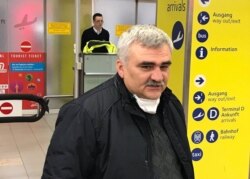On the day that he was abducted in Tbilisi, Georgia, Azerbaijani journalist Afgan Mukhtarli said he thought he would be killed. Instead, his captors drove him blindfolded to the Azerbaijan border and handed him to authorities, who charged Mukhtarli with crossing the border illegally and sentenced him to six years in prison.
The journalist's case shows the extreme lengths to which Azerbaijani authorities appear willing to go to retaliate against their critics.
In his first media interview since his early release from prison on March 17, Mukhtarli told VOA's Azeri service about how he was abducted in Georgia — to which he and his family had fled in 2014 — and jailed for nearly three years in Azerbaijan.
Speaking from Germany, Mukhtarli appeared relieved and calm as he recounted his experiences and disputed the government's account that he crossed the border illegally.
"The Azeri government spent a lot of money to kidnap me. They spent a lot of money to disperse Azerbaijani activists in Georgia," Mukhtarli said.
The journalist recalled how, in an interview with VOA's Azerbaijani service before his abduction and arrest, he had said the Azeri government was following activists in Georgia.
"[The] Azerbaijani government spends millions of dollars to go after its opponents in Georgia and abroad," Mukhtarli said.
Mukhtarli, who was a freelancer for Meydan TV, had fled to Georgia after receiving threats over his work. He'd reported critically on the Azerbaijani government, including allegations of corruption.
Before his disappearance and arrest, he was investigating the finances of the family of President Ilham Aliyev for the Organized Crime and Corruption Reporting Project, the BBC reported.
On the night of his abduction, Mukhtarli said he was in downtown Tbilisi, where several government buildings are located. He said the people who took him captive wore Georgian police uniforms.
"I initially thought they were going to murder me and blame it on robbers. I asked them to use a gun. Instead, they told me that they would hand me over to the Azerbaijani security forces," Mukhtarli said. "I was driven blindfolded to the Lagodekhi border post where I was handed over to the border patrol in the Azerbaijani region of Balaken."
The journalist said that the Azerbaijani officers who took him into custody later testified against him in court.
"This incident has affected Georgia's image as a law-abiding country," Mukhtarli said.
"The Georgian officials were persuaded by the Azeri government that my abduction would not cause too much ruckus. But they were proven to be wrong thanks to the international attention."
In a statement emailed to VOA on March 18, the Azerbaijan Embassy in Washington said that Mukhtarli "was detained while trying to illegally cross the border between Azerbaijan and Georgia."
The embassy has not yet responded to VOA's request for further comment on the situation.
Mukhtarli spent nearly three years in prison in Azerbaijan. He'd been sentenced to six years on the border-crossing charge and for allegedly bringing in contraband.
On Tuesday, his imprisonment ended when a court ordered his release and Mukhtarli was able to fly to Germany and reunite with his wife and daughter.
"The Azerbaijani government released me on the condition that I would not stay in Azerbaijan," Mukhtarli said. "I was hastily driven to the airport 15 minutes after the snap trial, where my own lawyers did not participate. I was greeted by representatives of the German Embassy, flown to Moscow and then to Berlin."
His wife left Georgia for Germany in October 2017. In an interview with Index on Censorship last year, Leyla Mustafayeva said she believed she was being stalked. Mustafayeva, who is also a journalist, said she filed a complaint with Georgia police but they did not investigate.
Responding to a question about Mukhtarli's abduction at the Parliamentary Assembly of the Council of Europe (PACE) in April, Georgia's Prime Minister Mamuka Bakhtadze said that an investigation into whether Georgia was involved was ongoing.
Stefan Schennach, the PACE co-rapporteur for the monitoring of Azerbaijan, said the Azeri government was ignoring the issue.
Azerbaijan has extradited or attempted to arrest at least four other journalists and bloggers living overseas, including from Turkey and Ukraine, according to reports and rights groups.
The U.S. State Department report on human rights in Azerbaijan noted "multiple reports of government abuse of international law enforcement tools, such as Interpol, in attempts to detain expatriate activists."
The Organized Crime and Corruption Reporting Project (OCCRP) reported in 2017 that between 2012 and 2014, Azerbaijan's leaders used a multibillion-euro slush fund to target critics. The OCCRP reported that over 90 journalists, activists and critics were jailed on politically motivated charges during the same period.
"Unlike the Georgian government, the Azerbaijani government is no longer concerned about its image abroad. Many in Europe recognize it as a dictatorship," Mukhtarli said.
Gulnoza Said, the head of CPJ's Europe and Central Asia Program, told VOA, "Azerbaijan authorities have for years cracked down on independent media by harassing, jailing, surveilling journalists and forcing them into exile where harassment often continues."
She added, "Mukhtarli's release came after a lot of international pressure. However, other journalists are still languishing in jail simply for doing their job — reporting. Injustice continues in their cases."
People responsible for Mukhtarli's abduction in Georgia and unlawful imprisonment in Azerbaijan have not been held accountable, she said.
Now that he is free, Mukhtarli said he intends to raise the fates of other Azerbaijani journalists.
They include Mehman Galandarov, a blogger who was found dead in a prison cell in 2017. Rights groups, including Human Rights Watch and the Institute of Peace and Democracy, have described his death as suspicious.
"I intend to bring this matter to light," Mukhtarli said.
This story originated in VOA's Azeri service.














